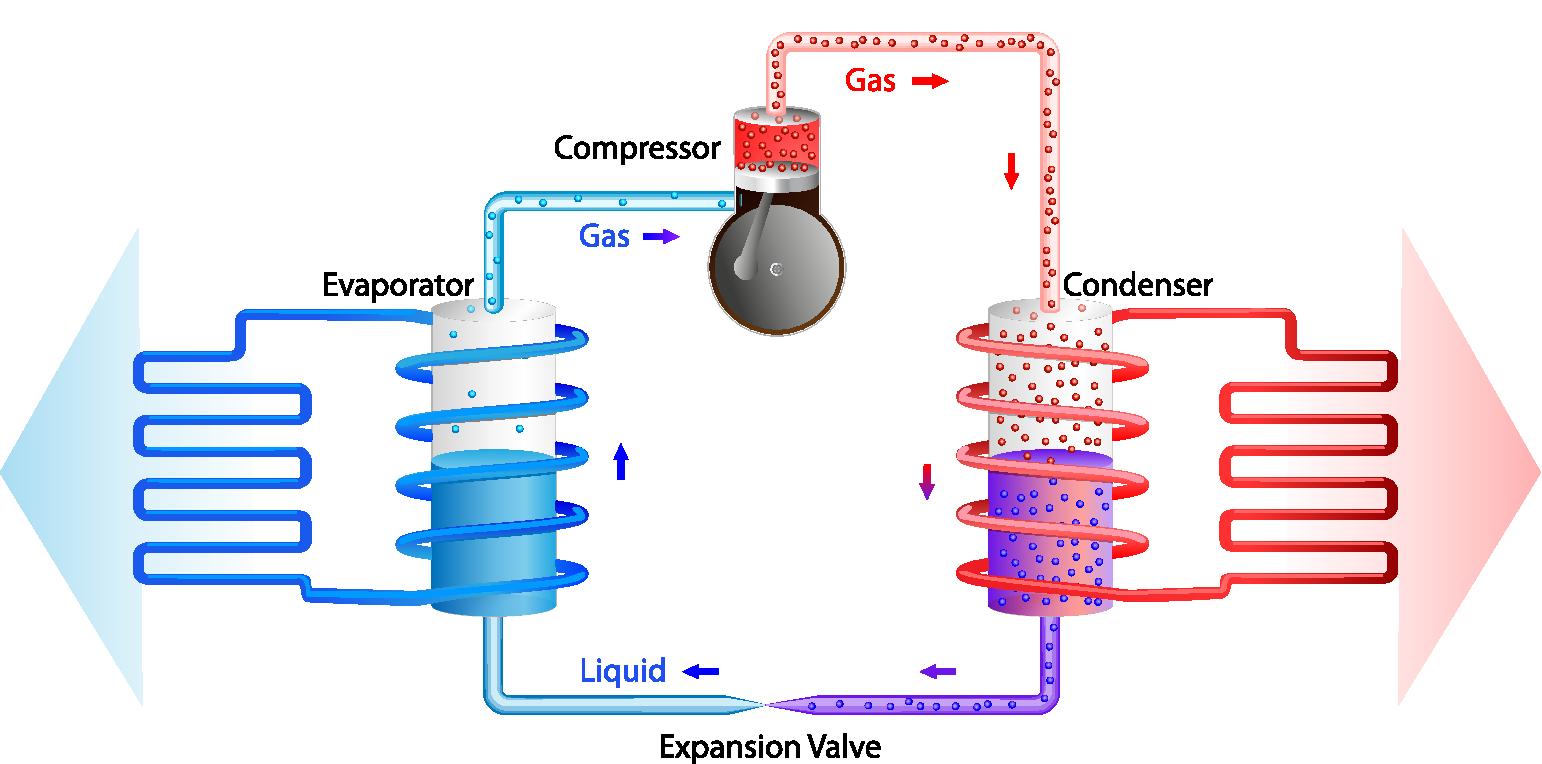
In recent years, the question of "how heat pumps work" has become increasingly relevant as these devices have surged in popularity among homeowners. This isn't a fleeting trend; it's a shift driven by the undeniable efficiency and versatility that heat pumps offer in various climates and conditions.
From homes in moderate weather regions to those in extreme climates, heat pump systems are revolutionizing the way we think about heating and cooling, delivering both comfort and energy savings.
Basic Principle on How Heat Pumps Work
At the core of how heat pumps work is a surprisingly simple yet brilliant concept: it moves heat, rather than producing it from scratch. This process is akin to how our refrigerators work, extracting warmth from their interiors and expelling it outside.
During colder months, a heat pump extracts latent warmth from the outdoor air (yes, even when it's cold!) and moves it inside to warm the home. Conversely, in the summer, it reverses this process, taking the heat from inside the house and releasing it outdoors, cooling the interior. This dual capability is what lends heat pumps their versatility, ensuring homes remain comfortable year-round, irrespective of the season.
This method of transferring heat, as opposed to generating it through energy-intensive means like burning fuel, is what sets heat pumps apart and makes them a cost-effective and environmentally friendly choice for modern households.

Core Components of a Heat Pump
Just as with any advanced equipment, the effectiveness and adaptability of heat pumps result from the seamless integration of multiple detailed components. Each element is crucial in facilitating the optimal functionality of the system. Here, we'll break down the main components of how heat pumps work and shed light on their individual functions.
The Evaporator Coil
Acting as the entry point for heat into the system, the evaporator coil is designed to absorb heat from the surrounding air. When air passes over this coil, the refrigerant inside absorbs the heat, causing the refrigerant to evaporate and transform from a low-temperature liquid into a warmer gas. In heating mode, the process is reversed, allowing the evaporator coil to release heat into the indoor space.
The Compressor
Situated in the outdoor unit of the heat pump, the compressor is the heart of the system. It circulates the refrigerant between the evaporator and condenser coils. As the refrigerant moves into the compressor, it is in a low-temperature gaseous state. The compressor then pressurizes this gas, raising its temperature significantly. This high-temperature gas is then routed to the condenser coil.
The Condenser Coil
Once the high-temperature gas reaches the condenser coil, it begins to release the heat it carries to the outside environment. In doing so, the refrigerant condenses back into a liquid form. It's essential to note that while in cooling mode, the heat pump releases indoor heat outdoors via the condenser coil. However, in the heating mode, the roles of the evaporator and condenser coils switch, allowing the system to extract heat from the outdoor air and release it indoors.
The Expansion Valve
The expansion valve serves as the gatekeeper for the refrigerant entering the evaporator coil. Once the refrigerant has released its heat in the condenser and returns to a liquid state, it needs to be depressurized before entering the evaporator coil again. The expansion valve regulates this process, ensuring that the refrigerant flows into the evaporator at the correct rate and pressure, primed once again to absorb more heat.
Collectively, these integral components illustrate how heat pumps work, harmoniously interplaying to offer thermal comfort. Their collaborative efforts affirm the brilliance embedded in contemporary HVAC designs.
The Heating and Cooling Cycle
Heat pumps have earned a reputation for being a marvel in the HVAC world due to their dual-function nature. Unlike conventional systems that either heat or cool, heat pumps can do both. This versatility is largely due to the system's ability to reverse its cycle. But how exactly does this process work?
The Heating Cycle
One of the most common misconceptions is that cold air lacks heat. In reality, even cold outdoor air contains some amount of heat. The heating cycle of a heat pump is built upon this principle. Here's a step-by-step breakdown:
- Heat Extraction
The cycle begins with the outdoor evaporator coil functioning to absorb any available heat from the ambient air. This causes the refrigerant within the coil to warm up and evaporate. - Compression
This gaseous refrigerant, now carrying the absorbed heat, moves to the compressor. Here, it gets compressed, leading to a significant rise in its temperature. - Indoor Heat Release
The now-hot refrigerant gas flows to the indoor condenser coil. As indoor air blows over this coil, the refrigerant releases its heat, warming up the inside of the home. During this process, the refrigerant cools down and returns to its liquid form. - Refrigerant Reset
Before the cycle restarts, the liquid refrigerant passes through the expansion valve, which regulates its flow and pressure as it re-enters the outdoor evaporator coil, ready to absorb more heat.
What's astonishing is that this system can extract heat even when it feels freezing outside, ensuring homes stay warm during chilly seasons.
The Cooling Cycle
As summer sets in, the need shifts from heating to cooling. This is where the heat pump’s ability to reverse its cycle comes into play:
- Heat Absorption
In this cycle, the indoor evaporator coil extracts heat from the home's interior. The refrigerant inside the coil absorbs this heat, causing it to evaporate into a gas. - Compression
Similar to the heating cycle, the gaseous refrigerant moves to the compressor. It's here that the refrigerant is pressurized, increasing its temperature further. - Outdoor Heat Release
The hot refrigerant gas is then directed to the outdoor condenser coil. As outdoor air is blown over this coil, the refrigerant releases the absorbed indoor heat into the atmosphere. In doing so, the refrigerant condenses back into a liquid. - Refrigerant Reset
The cycle concludes with the liquid refrigerant passing through the expansion valve, adjusting its flow and pressure before re-entering the indoor evaporator coil.
During the cooling cycle, the heat pump acts like an air conditioner, removing excess heat from indoors and releasing it outside, ensuring a cooler and more comfortable home interior.
In both cycles, the heat pump's capability to move heat rather than generating it is what sets it apart from conventional systems, offering homeowners both comfort and efficiency no matter the season.
Refrigerants in Heat Pumps
The magic of how heat pumps work, as they efficiently warm or cool our homes, often seems complex. However, a pivotal player simplifies this intricate dance of heat transfer: the refrigerant.
This unique substance flows through the heat pump, absorbing, transporting, and releasing heat where necessary.
Refrigerants: The Heartbeat of Heat Transfer
Refrigerants are materials, typically in fluid form, designed to undergo phase changes (from liquid to gas and vice versa) at specific temperatures and pressures. It's these phase changes that allow heat pumps to regulate indoor temperatures. Here's a simplified overview:
- Absorption
As the refrigerant circulates through the evaporator coil, it absorbs heat from the surrounding environment, causing it to evaporate and transform from a cool liquid to a warm gas. - Transportation
This gaseous refrigerant, now laden with heat, is then compressed and transported to the next crucial component, either the condenser (in heating mode) or another coil (in cooling mode). - Release
At the condenser coil, the refrigerant releases the absorbed heat to the surrounding environment, condensing back into a liquid state in the process.
Without the refrigerant's ability to undergo these phase changes, the heat pump wouldn’t be able to transfer heat effectively, rendering it inoperable.
The Push for Eco-Friendly Refrigerants
In the early days of heat pump and air conditioner manufacturing, many refrigerants used were found to have detrimental effects on the environment, particularly on the ozone layer. Recognizing these hazards, the HVAC industry and international community rallied together, phasing out these harmful substances in favour of more environmentally friendly options.
Recent heat pump models are often equipped with these greener refrigerants, which offer:
- Lower Global Warming Potential (GWP)
Newer refrigerants have been designed to have a minimal greenhouse effect compared to their predecessors. - Ozone Layer Protection
The transition away from refrigerants like CFCs and HCFCs has contributed to the slow healing of the ozone layer. - Efficiency Improvements
Some of the modern eco-friendly refrigerants also offer better efficiency, ensuring that the heat pump performs at its optimum while consuming less energy.
While refrigerants play an integral role in the operational success of heat pumps, the continuous push towards environmentally friendly alternatives ensures that we can enjoy the comforts of our homes without compromising the well-being of our planet.
Benefits of Using Heat Pumps
As homeowners continue to seek solutions that balance comfort, cost, and environmental considerations, heat pumps are increasingly recognized as the ideal solution. Let's delve into the key benefits of using heat pumps in contemporary homes:
Energy Efficiency
One of the standout features of heat pumps is their extraordinary energy efficiency. Unlike traditional heating systems, which burn fuel to generate heat, heat pumps simply transfer heat. How does this make a difference?
- Heat Transfer vs. Heat Generation
Conventional heaters burn fuel or use electricity to produce heat, a process that inherently loses some energy. Heat pumps, on the other hand, move heat from one place to another, a process that requires considerably less energy. - Performance Ratio
Modern heat pumps have a high coefficient of performance (COP), which can range from 3 to 5 in optimal conditions. This means that for every unit of electricity used to run the heat pump, three to five units of heat are produced. This is a stark contrast to traditional heaters, which often have a COP of less than 1.
Cost Savings
The increased energy efficiency of heat pumps directly translates to tangible monetary savings for homeowners:
- Reduced Electricity Bills
Since heat pumps use less electricity compared to traditional heating and cooling systems, homeowners can see a significant reduction in their monthly bills. - Less Dependency on Fuel
For homes previously relying on fuel-based heating solutions, heat pumps can minimize or even eliminate the need for purchasing fuel. - Longevity and Maintenance
Heat pumps, given their fewer moving parts and advanced design, often have a longer operational life and may require less frequent maintenance than older systems. This translates to savings in the long run.
Eco-friendly Operation
Beyond the pocketbook, heat pumps also benefit our planet:
- Lower Carbon Emissions
With their efficient operation, heat pumps emit less carbon dioxide compared to traditional combustion-based systems. This plays a significant role in reducing a household's carbon footprint. - Reduction in Greenhouse Gases
As mentioned earlier, the shift to eco-friendly refrigerants in heat pumps also means a significant reduction in greenhouse gas emissions. - Sustainable Heating
For those homes powered by renewable electricity sources, using heat pumps further ensures a fully green heating and cooling solution.
Heat pumps are not only an advanced solution for modern heating and cooling needs but also a choice that champions sustainability, efficiency, and cost-effectiveness.
The science and engineering behind heat pumps, while seemingly intricate, centers around a simple principle: efficiently transferring heat instead of producing it. This ingenious mechanism, which reverses roles between heating and cooling, has positioned heat pumps as an essential player in the modern home's HVAC landscape. Their impeccable energy efficiency, cost-effectiveness, and reduced environmental impact underscore their value in today's eco-conscious world.
But beyond the mechanics and the numbers lies the bigger picture. As we collectively move towards a greener future, every choice matters. Heat pumps embody this transition – a marriage of innovation and responsibility.
Whether you're building a new home, renovating an old one, or just pondering over energy-efficient alternatives, it's worth giving heat pumps more than just a passing thought. For they are not merely a trend, but a testament to how we can live comfortably without compromising the well-being of our planet.
Considering a change? Remember, every switch to sustainable solutions like heat pumps paves the way for a brighter, cleaner future. If you're looking to embrace this change, contact HeatPumps.ca for expert heat pump installation or service. Make a move towards a sustainable future today.




